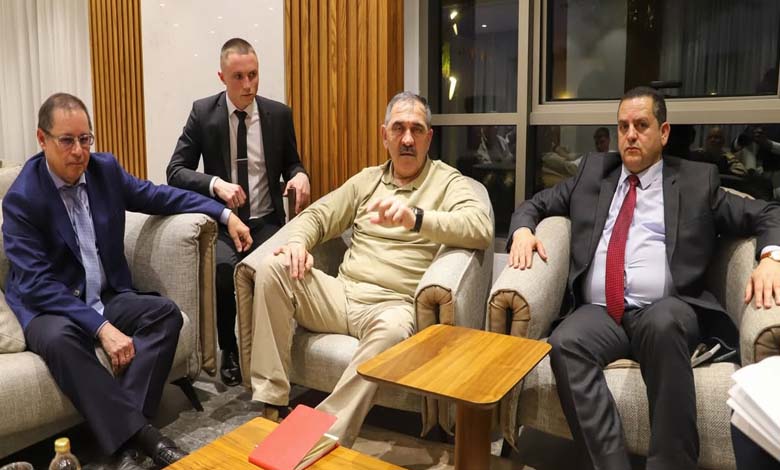Benghazi at the Heart of Regional Dynamics: Diplomatic Moves Amid Tripoli’s Turmoil

In recent days, Benghazi has hosted high-level delegations from Niger and Chad, alongside the arrival of Russia’s Deputy Minister of Defense, amidst rising tension in Tripoli and growing calls to dissolve the Government of National Unity led by Abdulhamid Dbeibah.
-
Washington Backs Al-Kabir in Dispute with Dbeibah, Warns Against His Replacement
-
A New Crisis in Libya Impedes Negotiations for Forming a Unified Government
Benghazi is increasingly asserting itself as a key hub in the evolving regional security equation. The city has witnessed a series of prominent political, military, and diplomatic engagements, as Tripoli descends into renewed violence and both public and institutional demands grow for an end to Dbeibah’s mandate. These developments are unfolding in a regional context marked by a gradual Western withdrawal and a steady Russian advance.
Against this backdrop, the authorities in Benghazi welcomed official delegations from Niger and Chad, alongside Russian Deputy Defense Minister Yunus-bek Yevkurov. These visits, aligned with the 11th anniversary of the pivotal “Operation Dignity” led by Field Marshal Khalifa Haftar since 2014, underscored Benghazi’s growing geopolitical weight.
-
Russian Oil Projects in Libya Threaten Western Interests
-
The Libyan Eastern Government Searches for Abducted Deputy
Leading the momentum, Chadian Defense Minister Issaka Marwa arrived at Benina International Airport at the head of a high-level military delegation, including the Deputy Intelligence Chief and presidential advisers. He was welcomed by Benghazi’s parallel government defense minister Ahmeed Houma and senior army officials. The visit aimed, officially, to “strengthen military and security cooperation” between the two nations amid growing instability and escalating jihadist attacks across the Sahel, notably from the Islamic State in the Greater Sahara and the Group for the Support of Islam and Muslims. N’Djamena also seeks continued cooperation with Benghazi over the rebel group FACT, held responsible for the death of President Idriss Déby in 2021.
-
Washington Denies Training Armed Groups in Tripoli under Agreement with Dbeibeh
-
European Concerns Over Russian Plans to Establish a Naval Base in Libya
Niger’s ministerial delegation, led by Interior Minister General Mohamed Toumba and accompanied by the Oil Minister and Secretary General of the Ministry of Mines, signals Niamey’s intention to expand bilateral cooperation to economic sectors. This follows Niger’s withdrawal from ECOWAS earlier this year, as part of a broader regional realignment. According to Benghazi’s foreign ministry, the visit reflects “the growing political momentum between both countries,” citing deep historical and geographic ties, and shared challenges such as irregular migration and cross-border terrorism.
-
Libya… Is Bathily seeking to extend the Debeiba government for two more years?
-
Haftar grants Dbeibeh a deadline for the fair distribution of oil revenues and threatens war
In parallel, the presence of Russian Deputy Defense Minister Yevkurov—officially invited to attend the “Operation Dignity” commemoration—was notable. He was welcomed by senior military officials, including Chief of Security Staff General Khaled Haftar and Military Intelligence Chief General Fawzi al-Mansouri. His visit follows a recent Moscow meeting between Vladimir Putin and Khalifa Haftar, where the use of Libyan territory as a Russian logistical platform was discussed, as Western influence wanes. These developments are seen as part of Russia’s broader strategy to gain a foothold in the Sahel, exploiting power vacuums, fragile governments, and a string of coups in Niamey, Bamako, and Ouagadougou.
-
One of the Leading Faces of Political Islam in Libya… What Is Al-Gharyani Seeking?
-
Details of Washington’s Diplomatic Return Plan to Libya on Congress’s Agenda
This eastern Libyan activity coincides with worsening violence in Tripoli, where heavy clashes between rival factions backing the unity government have led to casualties and growing domestic and international criticism of lawlessness. These disturbances have reignited public and parliamentary demands to end Dbeibah’s mandate. Protests erupted in several areas calling for “a new government that can restore services and state authority,” while lawmakers push for the formation of a unified government to end the deadlock.
Amid this crisis, Haftar is skillfully leveraging Tripoli’s fragmentation to bolster his status as a regional power broker recognized by neighboring states and supported by Russia. Diplomatic sources report that his envoys have recently conducted outreach missions in Burkina Faso, Chad, and Niger to build strategic ties with new military regimes.
-
Osama Hamad Urges Implementation of Decision to Cut Funding to the Dbeibeh Government
-
Demands for Formation of a New Government in Libya Pose Challenges for Dbeibeh
Saddam Haftar’s September visit to Niamey, where he met with President Abdourahamane Tchiani and received a national honor, marks a critical milestone in this trajectory. With Libya politically fractured, Western influence declining in North Africa and the Sahel, and Russia pushing forward with allies like Haftar, Benghazi is emerging not only as a military stronghold but as a regional coordination platform capable of reshaping the geopolitical landscape—particularly if chaos continues to consume Tripoli.












